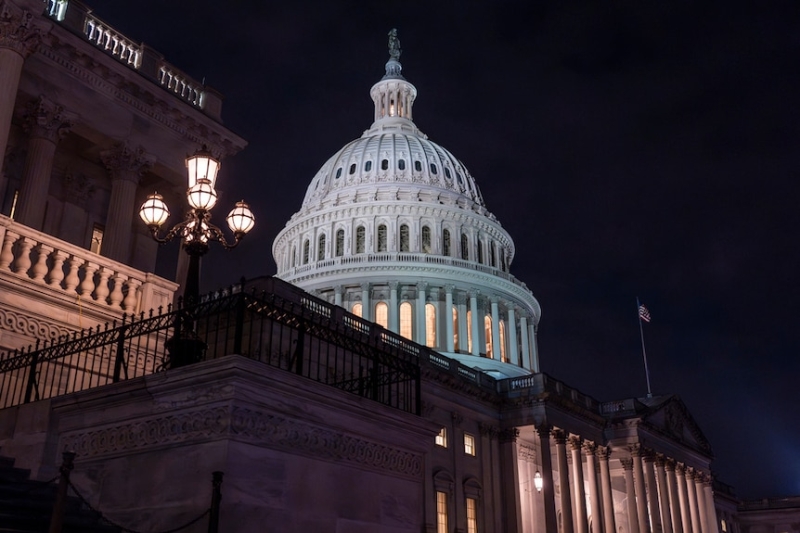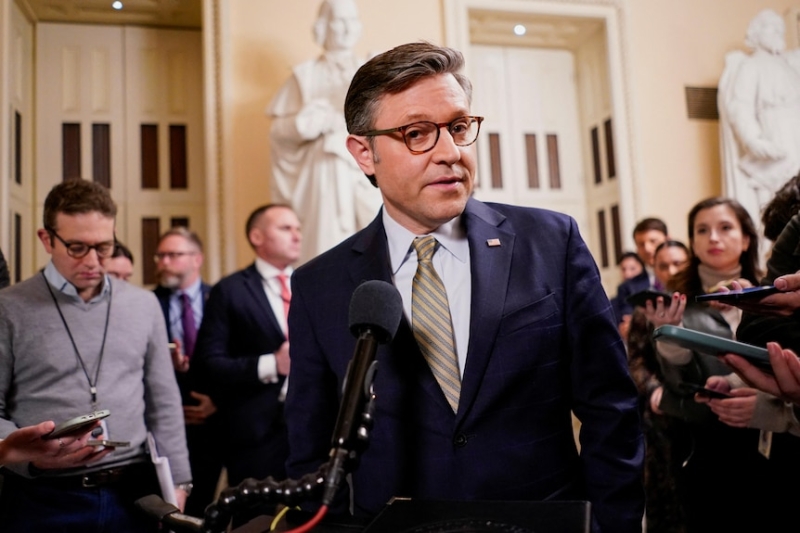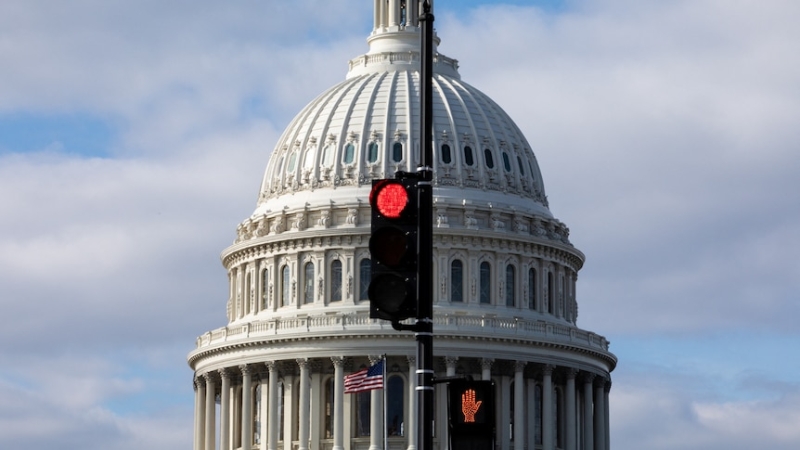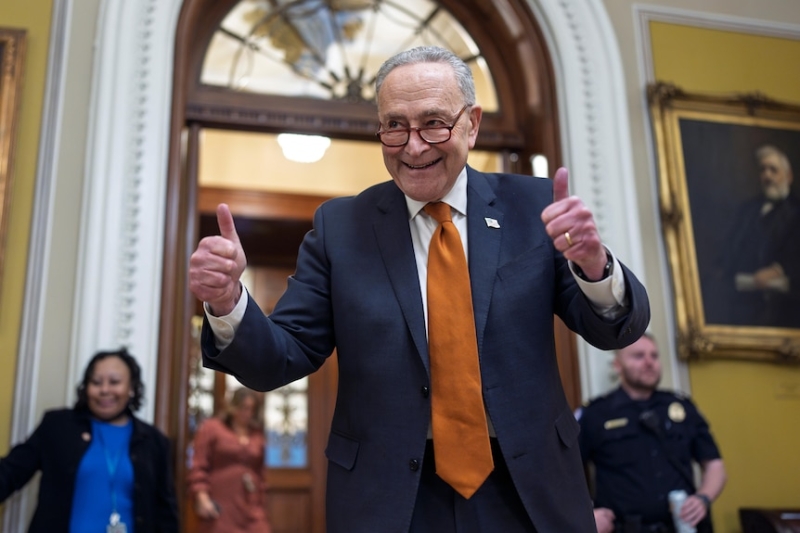In short:
The US Senate has passed legislation to extend public funding and end a temporary government shutdown after missing a midnight deadline.
The new legislation looks to extend government funding until March 14, provide $US100 billion for disaster-hit states and $US10 billion for farmers.
What's next?
Government funding will extend until March 14, after president-elect Donald Trump has been sworn into office.
The US Senate has passed legislation to extend public funding and end a temporary government shutdown after missing a midnight deadline to avert the closure.
The temporary shutdown came after the Republican-controlled House of Representatives passed legislation on Friday aimed at averting a midnight closure at Capitol Hill in Washington, in defiance of president-elect Donald Trump's demand to approve trillions of dollars in new debt.
The Senate had until midnight, local time (3pm AEST), on Saturday to approve that legislation, but were delayed by other matters being voted on by senators.
At 12:38am, the Senate announced that the bill had passed with a vote of approval of 85-11.
President Joe Biden is expected to sign his final approval of the bill later on Saturday.
The new legislation extends government funding until March 14, provides $US100 billion ($159.9 billion) for disaster-hit states and $US10 billion for farmers.
The bill would also not raise the country's debt ceiling, which Trump has pushed Congress to do before he is sworn into office on January 20.
Senate Majority Leader Chuck Schumer announced after the midnight deadline had passed that senators had reached an agreement and that the bill would pass.
Senate Majority Leader Chuck Schumer celebrated the news that the funding extension bill would be passed to avoid a Christmas government shutdown. (AP: J. Scott Applewhite)
"There will be no government shutdown right before Christmas," Senator Schumer told the Senate floor at 12:15am.
"After a chaotic few days in the House, it is good news that the bipartisan approach in the end prevailed.
"It's a good lesson for next year — both sides have to work together."
In the minutes after the midnight deadline passed, the US Budget Office also confirmed it had halted government shutdown preparations due to its "high degree of confidence" that the Senate would pass the legislation to continue government funding.
House Speaker Mike Johnson said earlier that Republicans would have more power to influence government spending next year, when they will have majorities in both chambers of Congress and Trump will be in the White House.

A major political debate has been waged in Washington over public funding, the US debt ceiling and the potential for a government shutdown. (AP: J. Scott Applewhite)
"This was a necessary step to bridge the gap, to put us into that moment where we can put our fingerprints on the final decisions on spending," he told reporters after the House of Representatives vote.
The package passed the House by a bipartisan vote of 366-34 after Republicans struck elements from the bill that were heavily criticised by Trump and his billionaire Department of Government Efficiency advisor Elon Musk.
Those elements included a provision that limited investments in China, which Democrats said would have conflicted with Mr Musk's interests.
"He clearly does not want to answer questions about how much he plans to expand his businesses in China and how many American technologies he plans to sell," Democratic Representative Rosa DeLauro said earlier on Friday on the House floor.
House Democratic Leader Hakeem Jeffries said the package had still accomplished important goals, such as delivering disaster aid, averting a shutdown and stopping Republicans from enacting a debt-ceiling hike that would make it easier to cut taxes.
"We have successfully advanced the needs of everyday Americans, but there are still things to be worked on and we look forward to that fight in the new year," Mr Jeffries told reporters on Friday.

Mike Johnson said the issue of government funding and the debt ceiling would be revisited after president-elect Donald Trump is sworn into office in January. (Reuters: Nathan Howard)
Debt ceiling hike rejected
Trump's demand to lift the debt ceiling in the US was resoundingly rejected by the House — including 38 Republicans — on Thursday.
The federal government spent roughly $US6.2 trillion last year and has more than $US36 trillion in debt, while Congress will need to act to authorise further borrowing by the middle of next year.
Mr Johnson said politicians would look at the issue in January.
Representative Rich McCormick, one of 34 Republicans who voted against the bill, said it did nothing to change the nation's fiscal trajectory and would only add to the debt load.
"We will be the country of the past if we continue doing what we're doing," he said.
The federal government last shut down for 35 days during Trump's first White House term over a dispute about border security.
What is the debt ceiling?
The debt ceiling is the total amount of money that the US government can borrow to meet its existing legal obligations.
Trump-backed spending deal failed as government shutdown neared
Photo shows capitol hill building in washington dc in the background with a red stop sign in the foreground

For the US Treasury Department to borrow above that amount, the limit must be raised by Congress.
A spike in inflation after the coronavirus pandemic pushed up the government's borrowing costs such that debt service next year will exceed spending on national security.
The last time politicians raised the debt limit was June 2023.
Rather than raise the limit by a dollar amount, they suspended the debt limit until January 1, 2025. At that point, the limit will be automatically raised to match the amount of debt that has been issued by the Treasury Department.
The debt limit vote in recent times has been used as a political leverage point, a must-pass bill that can be loaded up with other priorities.
AP/Reuters





